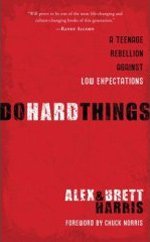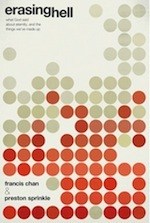I love writing book reviews and I love reading them. Since I cannot possibly read and review all of the interesting books out there, I publish occasional round-ups of reviews written by other writers. Or even if I am able to review the book, it’s always good to get a second opinion. So here are a few notable links I’ve collected over the past few weeks.
 Do Hard Things by Alex and Brett Harris. Reviewed by Jesse Johnson. “The Harris brothers point out that this expectation of worthlessness has produced years of wasted potential. In their book, Do Hard Things, they expose this culture of mediocrity as the teenager’s enemy. They make it clear that the victims in this are teens who squander their first opportunities in life to excel — to do things that count for eternity. … I would recommend this book be given high school students, and the younger the better. It could be a good graduation gift, but at that point the thrust of the book would already be in a person’s rear-view mirror. It is more suited for freshman. Those who read it will be challenged to escape the trappings of modern-American adolescent mediocrity.” (Learn more or at shop at Amazon or Westminster Books)
Do Hard Things by Alex and Brett Harris. Reviewed by Jesse Johnson. “The Harris brothers point out that this expectation of worthlessness has produced years of wasted potential. In their book, Do Hard Things, they expose this culture of mediocrity as the teenager’s enemy. They make it clear that the victims in this are teens who squander their first opportunities in life to excel — to do things that count for eternity. … I would recommend this book be given high school students, and the younger the better. It could be a good graduation gift, but at that point the thrust of the book would already be in a person’s rear-view mirror. It is more suited for freshman. Those who read it will be challenged to escape the trappings of modern-American adolescent mediocrity.” (Learn more or at shop at Amazon or Westminster Books)
Talking with Mormons by Richard Mouw. Reviewed by Kevin DeYoung. “At the most basic level, Mouw wants evangelicals to approach Mormons in a whole new way. While I think he rightly critiques one approach; his new approach is not the answer. Mouw criticizes the sort of approach that starts with an assumption that Mormons are some combination of stupid, evil, imposters, and charlatans and then offers the usual anti-Mormon talking points (God doesn’t have a body, Jesus and Lucifer were not brothers, Joseph Smith was nuts, early Mormons were polygamists, etc.). He is right to call evangelicals to a better way. But Mouw’s way is not it. “
 Erasing Hell by Francis Chan and Preston Sprinkle. Reviewed by David Steele. “Chan and Sprinkle serve up an impressive number of arguments that bolster the case for hell and provide a rational, biblical defense of this important doctrine. While Erasing Hell is written with the laymen in mind, it is not simplistic. Nor is it compromised in any way. The authors do not claim to have all this answers, which may appeal to younger readers more inclined to postmodern literature. Rather, they merely spell out the basics of the biblical doctrine.” (Learn more or shop at Amazon or Westminster Books)
Erasing Hell by Francis Chan and Preston Sprinkle. Reviewed by David Steele. “Chan and Sprinkle serve up an impressive number of arguments that bolster the case for hell and provide a rational, biblical defense of this important doctrine. While Erasing Hell is written with the laymen in mind, it is not simplistic. Nor is it compromised in any way. The authors do not claim to have all this answers, which may appeal to younger readers more inclined to postmodern literature. Rather, they merely spell out the basics of the biblical doctrine.” (Learn more or shop at Amazon or Westminster Books)
Captivating by Staci and John Eldredge. Reviewed by Staci Eastin. “Among women’s books in the Christian market over the last ten years, Captivating: Unveiling the Mystery of a Woman’s Soul by John and Stasi Eldredge, is one of the most popular. Its release in 2005 has led to the publication of journals, Bible studies, gift books, and an updated edition, and its influence is far reaching. Ideas put forth in this book have found their way into a lot of Christian women’s books, even from authors who have a reputation for being biblical and orthodox. This is not a comprehensive review. I found many things in this book that are unbiblical, but I’m not going to pull it apart point by point. I am going to focus on two things: what makes the book insightful (and therefore popular), and the book’s most glaring error (which in many ways leads to all its other errors).”
 The Glory of Grace by William Boekestein. Reviewed by Wes Bredenhof. “If William Boekestein were a hockey player, we’d say that he scored a hat trick – with assists from Evan Hughes on each goal. He first scored with Faithfulness Under Fire, his 2010 children’s book about Guido de Bres and the Belgic Confession. He followed up last year with The Quest for Comfort: The Story of the Heidelberg Catechism. Some had expressed the hope that he would come through with something on the Canons of Dort and now we have it!” (Learn more or shop at Amazon)
The Glory of Grace by William Boekestein. Reviewed by Wes Bredenhof. “If William Boekestein were a hockey player, we’d say that he scored a hat trick – with assists from Evan Hughes on each goal. He first scored with Faithfulness Under Fire, his 2010 children’s book about Guido de Bres and the Belgic Confession. He followed up last year with The Quest for Comfort: The Story of the Heidelberg Catechism. Some had expressed the hope that he would come through with something on the Canons of Dort and now we have it!” (Learn more or shop at Amazon)
A Woman’s Wisdom by Lydia Brownback. Reviewed by Becki Whetsel. “Readers of either gender could benefit from reading Brownback’s study. It is a sound introduction to the book of Proverbs. It is also a good example of how to speak to others on the basics of Proverbs and point them to Christ, the wisdom of God. There is a study guide attached that promises to be a good tool for cementing the main points of each chapter. Whether written to women or men or both, Brownback’s study of Proverbs is far better than a typical ‘how-to’ book, as she points us not to ourselves or our checklists, but to Christ, ‘in whom are hidden all the treasures of wisdom and knowledge’ (Col. 2:3).” (Learn more or shop at Amazon or Westminster Books)










